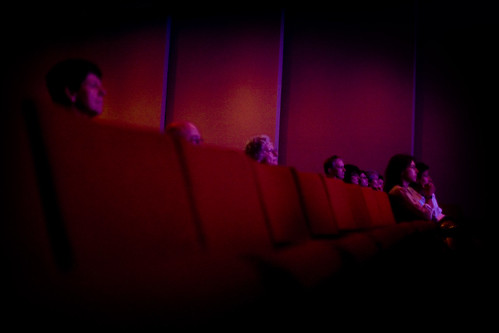“Be sure that you go to the author to get at his meaning, not to find yours.” -Salman Rushdie
Recently I did something that I’ve rarely done in my life as a theater lover – I walked out of a production at intermission. Was I offended by a controversial subject? Well no, I did make it through Jerry Springer: The Opera after all. I was merely bored out of my mind by densely esoteric content. I didn’t become enraged and demand the play close, I merely chalked it up to a difference in artistic preferences. But I still left, and afterwards it upset me that I’d allowed myself to close my mind, and I started thinking about local theater controversy. As a former theater professional it was ingrained in me that we have a responsibility to open minds through art. But what happens when the audience won’t listen? Are DC audiences more likely to be vocal or take offense? How do theater companies handle that reaction, especially as its based on content and not value?
I set out to talk to three artistic directors of companies at various levels of development and experience with negative audience reaction to content- Allison Arkell Stockman at Constellation Theatre Company, Kate Bryer at Imagination Stage, and Ari Roth at Theater J – to get their thoughts. Not surprisingly, a common theme emerged, one which as a theater lover worries me greatly. When we move away from an audience’s desire to learn and instead towards its desire for safe entertainment, we’re in trouble as a society.

‘People in a Red Theater’
courtesy of ‘maxedaperture’
Constellation Theatre Company’s current production of the Indian epic The Ramayana is playing to sold-out houses. It’s a young company helmed by artistic director Allison Arkell Stockman, who also directed The Ramayana. In my review I noted the original production had met with some controversy in London over audience members taking offense for religious reasons, and asked for feedback from readers. We had two opposing views from those of Indian heritage – one deeply offended to the point of calling for the play to be banned, one enjoying it greatly. That’s a big divide!
“We want to welcome debate and conversation,” Stockman told me, “although most of the audience, including most Indians, seem to really like the production we have had a couple people find it offensive.”
How do you engage your audience nowadays? Of course, the way we all interact now – online. Constellation started a blog to encourage dialogue on the issues raised by reactions to The Ramayana. Stockman feels strongly that “the audience is an essential, vital part of the theatre experience and we are always eager to hear their thoughts, opinions and feelings, both supportive and critical.”
But is opening up the floor for dialogue enough? Giving the audience a place to air their opinions is one thing, but what happens when they don’t think that’s enough?
Associate artistic director Kate Bryer fields parental reaction season-round at Imagination Stage. She believes “it’s much harder for children’s theater which answers to parents objecting to content.” Most often these objections are because content is presented that parents may not feel comfortable addressing with their children. Take their current production of The Dancing Princesses, which explores the fairy tale through the prism of how a family copes with grief. Though it’s clearly stated in the synopsis online, many parents objected to the mother’s death being portrayed. Like Constellation Theatre, Imagination Stage also has a blog to interact with audience reaction and Kate wrote a beautiful post defending the play.
She further attempts discussion with parents who call in responding negatively. As a mother herself, she’s sensitive to the issues and the need for preparation, but notes you can’t isolate children entirely from uncomfortable topics and eventually they will ask the tough questions. “Everyone should learn from theater,” she says, “even in children’s theater it’s important to provide them with meaningful experiences. All we can do is present the material in a sensitive, artistic and honest way, and ask people to be open to another point of view.”
Imagination deals with another wrinkle in that it produces new plays, which are commissioned a year or so in advance, so it’s sometimes difficult to predict what the final result will be as far as specific age-appropriateness. They do all due diligence beforehand, by advertising clearly the play’s content matter and highlighting any possible hot spots in advance. Throughout rehearsal they prepare for possible reactions and once it’s in performance, Kate actively engages in dialogue with parents. I was amazed by the range of topics that can cause problems – not just the deep issues like loss and death but trickier ones to spot like how to handle rudeness. It’s not an easy job when both sides are passionate.
“Theater isn’t telling you what to think,” Kate says, “we are offering you an opportunity to see a different view of the world. You don’t have to agree, but we ask you to be open and look.”
Are we losing this ability as a society, to engage in open and rational discussion? It worries me, this death of civility that can be highlighted even more strongly online.

‘DSC_3450’
courtesy of ‘bhrome’
“We don’t seek out controversy, we seek out issues needing to be discussed,” says Theater J’s artistic director Ari Roth,”we’re not spoiling for a fight.” Theater J has a long history of producing thought-provoking works, which has seen some controversy since their beginning twenty years ago and under Roth’s helm since 1998. The most recent has happened before an actual production even hit the boards, with the announcement that Theater J would pull their planned production of Deb Margolin’s new play Imagining Madoff, due to objections by Elie Wiesel, a metaphorical character in the play. Washington City Paper unravels this history in depth, and compared with some of the previous instances of controversy for Theater J – readings of Caryl Churchill’s Seven Jewish Children: A Play for Gaza, My Name is Rachel Corrie, or even Sandra Bernhard’s Without You I’m Nothing – the Madoff incident is just a casualty of an ongoing battle to open minds.
Though Roth is obviously extremely adept at handling negative reaction, he’s noticed its nature has been markedly different over the last year and a half. He believes that’s due to the heated environment of a growing political divide, influencing “a protest that’s toxic.” With culture wars being refought and the rise of a much less civil society, those factors are becoming more prevalent in the way people respond in all situations, including theater. This “culture of intolerance” he sees is reflected in people’s lack of desire to engage in real dialogue.
Currently Theater J is running a program called Voices from a Changing Middle East. Last week they performed the most produced drama in Israeli history, Games in the Backyard, which is seen in Israel as a way to educate kids about the moral implications of living in a violent age. It’s a courtroom case investigating an alleged schoolyard rape. Roth doesn’t believe a similar production would ever be performed at schools in the States. “In the U.S. we want to protect and shelter our kids,” he says, echoing Bryer’s concerns, “but it’s cowardly to think we can.” I’d argue we risk doing the same with adults.
Roth ended our conversation with a statement that still reverberates with me – “We need to trust theater to be an engine of enlightenment.”
I couldn’t agree more. As a young drama student at Catholic University I witnessed firsthand what happens when controversy becomes the main focus, rather than the play’s meaning itself, when suddenly people are talking about banning content and cancelling performances. The next time you are in a theater and find yourself outraged by its content, ask yourself why. Are you truly being open, are you listening? Is it uncomfortable to be shown a viewpoint radically different from your own? And why would you want to silence it?



Walked out of “Cats” at intermission. Possibly the wisest decision I’ve ever made.
HA! Kevin, that made my day.
Jenn,
You really outdid yourself this one! Fantastic!
Pingback: best in the box « Tom Minter's Off The Stoop Blog
After some exhaustive research, I have reached to a conclusion that versions of Ramayana exists in many languages, including Annamese, Balinese, Bengali, Cambodian, Chinese, Gujarati, Javanese, Kannada, Kashmiri, Khotanese, Laotian, Malaysian, Marathi, Oriya, Prakrit, Sanskrit, Santhali, Sinhalese, Tamil, Telugu, Thai, Tibetan, etc. In Sanskrit itself there are 25 different versions. According to A. K. Ramanujam, more than 300 tellings of Ramayana exist.
Each has newer dimensions, more fascinating than the other.
Read them in reverse order here- http://souravroy.com/?s=too+many+ramayanas
Pingback: Who Would Have Imagined? Imagining Madoff in the News | The Theater J Blog